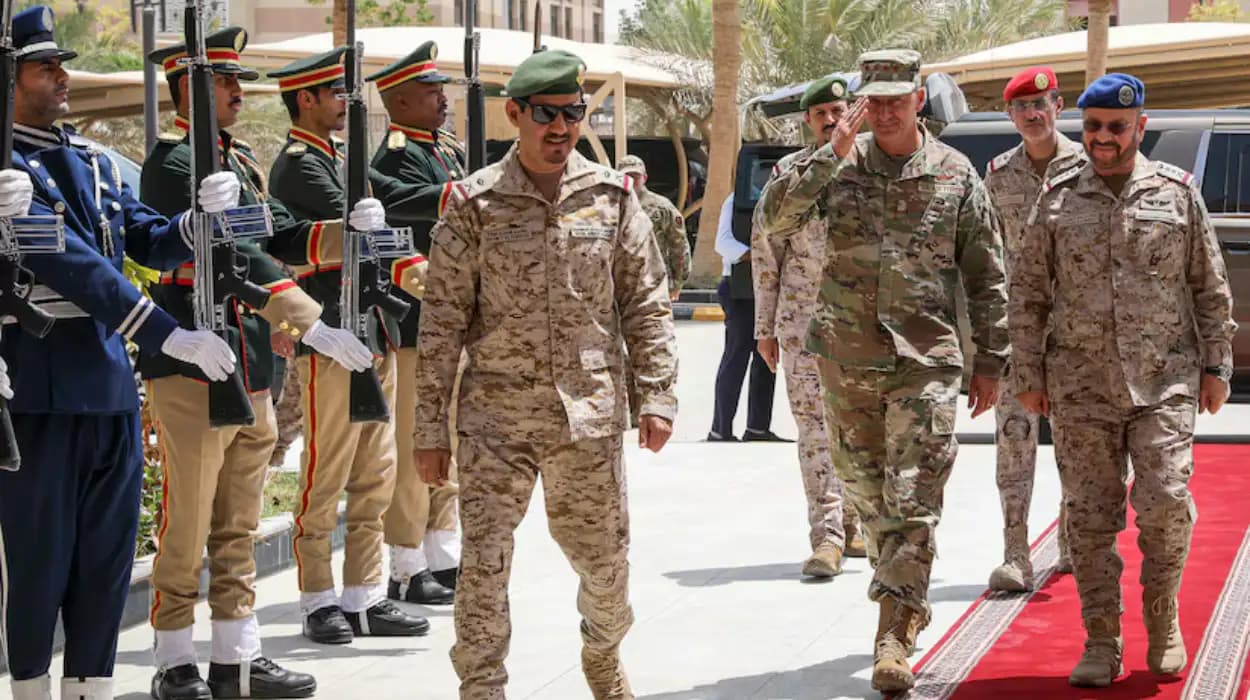The United States and Saudi Arabia have taken a significant step to deepen their longstanding relationship through the formal inclusion of Saudi Arabia into the U.S. Department of Defense's State Partnership Program (SPP). This historic agreement was officially signed on August 21, 2025, in Riyadh, marking a key development in military and strategic cooperation between the two nations. The new partnership aligns Saudi Arabia with the National Guards of Indiana and Oklahoma, creating a trilateral defense collaboration designed to enhance military capabilities, foster joint training, and improve interoperability.
A Historic Ceremony and Strategic Significance
The signing ceremony in Riyadh was attended by high-ranking military officials, including U.S. Air Force General Steve Nordhaus, Chief of the U.S. National Guard Bureau, alongside Saudi Arabia’s Chief of the General Staff, Lieutenant General Fayyad Al-Ruwaili. The presence of Brigadier General Lawrence Muennich from the Indiana National Guard and Major General Thomas Mancino of the Oklahoma National Guard underscored the program’s importance.
General Steve Nordhaus stated,
"This agreement reflects the deep strategic relationship between our nations, built on decades of cooperation and a shared commitment to global security."
His words highlighted the enduring partnership that has been evolving over many years and is now taking a more institutionalized form with Saudi Arabia’s integration into the SPP.
This partnership marks a new chapter in U.S.-Saudi military relations, emphasizing not just the exchange of training but the sharing of expertise in critical areas such as cybersecurity, disaster response, aviation maintenance, and counter-uncrewed aerial systems operations. The program is designed to build trust, strengthen deterrence, and promote interoperability among allied forces, contributing significantly to regional stability.
The Scope and Objectives of the State Partnership Program
The State Partnership Program is a Department of Defense initiative that pairs U.S. states’ National Guards with partner countries for military cooperation. With Saudi Arabia joining, the program now includes 115 partner nations, demonstrating its global reach and strategic importance.
The trilateral partnership between Saudi Arabia, Indiana, and Oklahoma National Guards includes multiple planned activities and engagements. These began unofficially in late 2024 with exchanges focused on cybersecurity and disaster response. The collaboration aims to equip Saudi forces with advanced training and operational readiness that aligns with U.S. military standards.
Major General Thomas Mancino of Oklahoma National Guard emphasized the practical benefits, explaining,
"Our partnership with Saudi Arabia allows us to share best practices and strengthen capabilities in areas that are vital for modern military operations and regional security."
The SPP will also facilitate joint exercises and continuous communication channels, reinforcing the cooperative spirit and operational synergy between these military forces.
Broader Context of U.S.-Saudi Relations
This military partnership comes amid a broader strategic recalibration between the United States and Saudi Arabia, reaffirming shared interests in regional security and economic stability. The countries have held extensive dialogues over the years, focusing on counterterrorism, economic collaboration, and regional conflict resolution.
The U.S. and Saudi Arabia have consistently cooperated to counter threats posed by Iranian regional influence, terrorist groups, and destabilization efforts across the Middle East. This cooperation is not only military but extensively political and economic, further reflected by Saudi Arabia’s Vision 2030 reforms and leadership within international forums like the G20.
As U.S. Air Force General Nordhaus remarked,
"Our partnership extends beyond the battlefield. It’s about strengthening institutions and building capacities that benefit both nations and the region at large."
The integration into the SPP enhances this partnership’s military dimension, tying Saudi Arabia more closely to U.S. defense mechanisms and cooperative frameworks.
Economic and Strategic Implications
The enhanced defense cooperation also dovetails with ongoing economic ties between the U.S. and Saudi Arabia. The Kingdom is a critical trading partner in the region and has seen increasing U.S. investment commitments to support its economic diversification efforts.
President Donald J. Trump, during his first visit back as president in 2025, underscored the significance of renewed ties, stating,
"We celebrate more than 80 years of close partnership between the United States and the Kingdom of Saudi Arabia... This new chapter in our relationship reflects mutual trust, shared goals, and the commitment to a safer, more prosperous future for our peoples."
This sentiment is amplified by the involvement of over a dozen U.S. defense firms providing advanced warfighting systems and services to Saudi Arabia. The partnership, therefore, extends into defense procurement and technology transfer, solidifying the Kingdom’s military modernization.
Future Outlook and Regional Impact
The U.S.-Saudi State Partnership Program is expected to serve as a cornerstone for further cooperation. It promises increased stability in a region marked by complex geopolitical challenges. Saudi Arabia's strategic positioning and military enhancements are critical to countering emerging threats from non-state actors and state adversaries alike.
The partnership also incorporates non-kinetic domains like cybersecurity, which is vital in the era of digital warfare and critical infrastructure protection. Initial joint training events are already underway, setting the tone for a sustained and dynamic collaboration.
Lieutenant General Fayyad Al-Ruwaili remarked,
"This partnership is not only a milestone for our armed forces but a testament to our shared commitment to peace and security in the region."
The trilateral agreement further aligns with broader U.S. efforts to deepen security and intelligence collaboration with key Middle Eastern allies. It complements ongoing dialogues on trade, energy security, and diplomatic engagement, highlighting a multifaceted alliance.
In conclusion, the integration of Saudi Arabia into the U.S. State Partnership Program is a landmark development, framing a more integrated military and strategic partnership that promises mutual benefits in defense, security, and economic fields. It underscores a shared vision for regional stability and global security in an increasingly complex international landscape.

